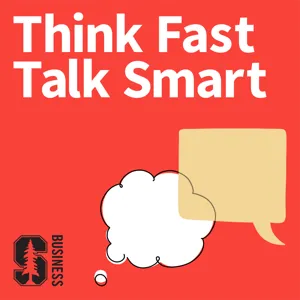Podcast Summary
People remember emotional connections to books more than specific details: Emotional connections to books can last a lifetime, despite limited recall of plot and character details
Learning from this episode of No Stupid Questions is that people often remember the emotional connection they have with books, rather than the specific details of the plot or characters. Angela and Stephen discussed how it's common for people to love books deeply but have trouble recalling the intricacies of the story. Pamela Paul, the editor of The New York Times Book Review, adds that she often remembers the physical object of the book, such as the cover or where she bought it, more than the actual content. This emotional connection to books can be so strong that some people treasure certain titles as much as any other physical object due to the memories and feelings associated with them. Despite the time and effort invested in reading, the solid return in terms of remembering every detail may be limited, but the emotional connections made can last a lifetime.
The emotional impact of reading: Reading for pleasure is about the emotional experience, not necessarily remembering every detail.
The intent and investment we put into reading can greatly impact our ability to remember the details of a book. The speaker shared a personal anecdote about a biography that left a strong impression on him, even if he couldn't recall many specific details about the subject's life. He emphasized that sometimes, reading for pleasure is about the emotional experience rather than remembering every detail. The speaker also acknowledged that different types of reading, such as academic research or emails, require different levels of focus and memorization. He concluded by sharing a conversation with a memory researcher, who suggested that our brains may not actually forget the plots of books we've read, but rather, we may not consciously recall them due to a lack of intent or investment in remembering. Ultimately, the speaker encourages readers to embrace the different ways in which reading enriches our lives, rather than focusing on the need to remember every detail.
The more we learn, the more we remember: Learning new information enhances memory, forgetting curve shows that we forget less over time, but excessive remembering can lead to negative consequences
Memory and knowledge are interconnected. The more we learn, the more we remember. This was a key insight for the speaker during the writing of their first book, a family memoir. They found that as they delved deeper into their family history and spoke with others, their memories became clearer. This concept is supported by the forgetting curve, a psychological theory that explains how memory works. The forgetting curve shows that we forget a lot immediately after learning something, but the rate of forgetting slows down significantly over time. The good news is that when we re-expose ourselves to the information, we can remember it again quite well. However, it's important to note that remembering too much or too often can also have negative consequences, such as rumination, a mental process where we compulsively replay experiences in our minds. So, while it's important to strive for accurate and complete memories, it's also crucial to recognize the limitations of our memory and the benefits of forgetting.
Creating Meaningful Connections for Better Memory: Focus on creating emotional connections and meaning instead of trying to memorize every detail for effective memory retention.
Our brains are better at remembering information when we create meaningful connections with it. The speaker shared an example from their experience as a guest on a live game show, where despite intense preparation and interaction with various guests and topics, they had forgotten most of the details once the show was over. However, they did remember how the experience made them feel and the connection they formed with their daughter over a shared book. Similarly, in memory competitions, participants use meaningful sequences and connections to remember large amounts of information. The speaker mentioned a study where a runner used his long-term memory to remember digits by associating them with running times. Therefore, focusing on creating meaning and connections rather than trying to memorize every detail can be an effective memory strategy. The speaker also emphasized that it's not necessary to remember every detail, but rather the emotional impact and significance of the information.
People's perception of their impact on others can be skewed: Our influence on others can be overestimated or underestimated, affecting our self-confidence and how we interact with others. Research suggests that our perception can be skewed, so it's essential to consider context and circumstances.
While people may care about the impact they have on others' lives, they often overestimate or underestimate their significance. For instance, in some situations, individuals may overestimate their influence, leading to self-consciousness and insecurity. Conversely, in other instances, people may underestimate their impact. Research, such as the spotlight effect by Tom Gilovich and an experiment by Nick Eppley at the University of Chicago, supports this idea. Eppley's study showed that people care less about what others are wearing than they believe. Overall, it's essential to remember that our perception of our influence on others can be skewed, and it's crucial to consider the context and circumstances involved.
The Power of Compliments: Compliments underestimated for their positive impact on others. Dale Carnegie emphasizes sincere compliments, but their effectivity depends on intention and context.
The power of compliments is often underestimated. Research by psychologist Erica Boothby shows that we underestimate the positive impact compliments have on others. Barry Manilow, an unlikely source, is even used as a solution to disperse noisy teenagers in Australia by playing his music loudly. Dale Carnegie's book "How to Win Friends and Influence People" emphasizes the importance of giving sincere compliments. However, it's important to note that the impact of verbal compliments might not be the same as physical gifts, and the intention behind the compliment plays a role in its effectiveness.
The Impact of Our Words and Actions on Others: Be mindful of the impact of our words and actions on others, communicate effectively, and accurately estimate our influence through self-awareness and clear communication.
Our actions and words, especially in a work setting, can have a greater impact on others than we may realize. We should be mindful of this and strive to communicate effectively and considerately. When we underestimate our influence, we may unintentionally hurt or discourage others. On the other hand, overestimating our significance can lead to unnecessary praise or gifts that may not align with the situation. Adam Smith's theory of moral sentiments highlights the importance of gaining the esteem of others through genuine praise and actions. To remedy underestimating our influence, we can approach feedback conversations with the assumption that the other person intends the best, and express our concerns in a non-confrontational way. To signal less influence when desired, we can encourage creativity and proactivity by delegating tasks and providing clear expectations. Ultimately, effective communication and self-awareness are key to accurately estimating our impact on others.
Seeking feedback for calibration: Direct communication can build connections but consider context and power dynamics to avoid being perceived as intrusive or risky.
Direct communication can be an effective way to build connections and understand how others perceive us. According to social psychology research, people often overestimate or underestimate how much others like or care about them. To address this uncertainty, asking for feedback directly can help us calibrate our perceptions. However, it's essential to consider the context and power dynamics. For instance, a high-status person directly expressing interest in joining a group can be impressive and likable. On the other hand, a low-status person directly approaching a high-status person with a request to be part of their group can be perceived as intrusive and risky. Instead, low-status individuals might consider finding common ground or offering value to the group before expressing their desire to be part of it. Overall, direct communication can be a powerful tool for building connections, but it's crucial to consider the context and potential risks.
The importance of care and empathy in therapeutic relationships: Therapists' genuine care and empathy are crucial for positive therapeutic outcomes. Books evoke memories and emotions, and literary references can be complex.
Therapists, due to their profession and personal inclination, genuinely care about helping people, making the therapeutic relationship a valuable source of support and understanding. During the discussion, the importance of therapists' empathy and dedication was emphasized. They not only listen attentively but also genuinely care about their clients' well-being. This caring attitude is a crucial aspect of therapy that often helps people feel heard and understood, leading to positive therapeutic outcomes. Additionally, the conversation touched upon the significance of books and memory. Books serve as more than just containers of literary content; their design, including dust jackets, can evoke memories and emotions. Furthermore, the discussion highlighted the intricacies of literary references and their potential for inadvertent misquotations. In summary, the conversation highlighted the importance of genuine care and empathy in therapeutic relationships, the emotional impact of books, and the intricacies of literary references.
The Power of Influence: This episode explores the far-reaching impact of influence on our daily lives, from productivity to decision-making, and references various studies, experts, and books for further exploration.
Key takeaway from this episode of Freakonomics Radio is the power of influence and how it shapes our everyday lives. Steven and Angela shared various examples, from the impact of music on productivity to the hidden motivations behind our decisions. They also referenced several studies, experts, and books that delve deeper into these topics. If you're interested in learning more, you can check out freakonomics.com/nsq for links to the major references mentioned in the episode. A fun anecdote shared was about Steven's mom's needlepoint business where the employees were known as "Fanilows" and only listened to Barry Manilow, highlighting the power of influence in shaping our environments and preferences. Overall, this episode emphasizes the importance of understanding the hidden forces that influence our behavior and decisions.





